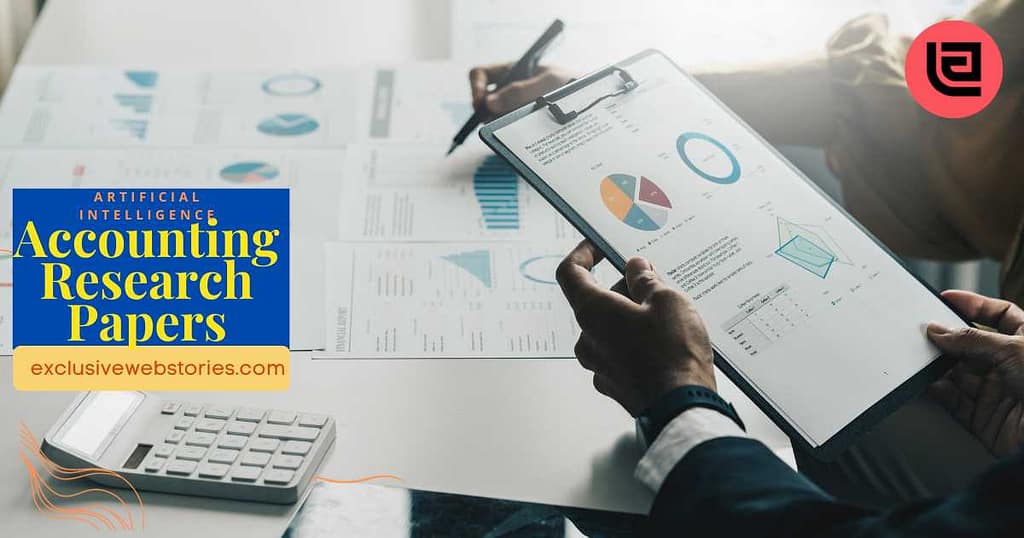Exclusive Web Stories)– Artificial Intelligence in Accounting Research Paper
- Learn how Artificial Intelligence (AI) is revolutionizing the field of accounting studies.
- Discover more about the impact artificial intelligence has on the future of research, including how it speeds up data processing, simplifies literature reviews, and more.
- Learn about the moral implications and the potential of new ideas.
- Explore the cutting edge of accounting science with artificial intelligence today!
- Accounting is only one field that has benefited greatly from the advent of artificial intelligence in recent years.
- This article dives into the realm of artificial intelligence in accounting research paper, discussing how AI is changing the profession and its potential future outcomes.
Also Read:
Artificial Intelligence in Internal Audit, Auditing To The New Era
1. Introduction to Artificial Intelligence in Accounting

There has been a significant shift in the analysis of financial data since accounting research articles began incorporating artificial intelligence techniques.
Researchers increasingly use machine learning and natural language processing.
1.1 – Understanding Artificial Intelligence in Accounting Research
Let’s start with a definition of artificial intelligence from the perspective of academic accounting studies.
Artificial intelligence (AI) makes machines think and act like humans. This includes the ability to analyze data, recognize patterns, and make decisions.
2. The Impact of Artificial Intelligence on Research Paper Writing
2.1 – Improved Data Analysis
Using artificial intelligence in accounting research articles can help improve data analysis, which is a crucial part of the field.
Artificial intelligence systems can rapidly process massive datasets, accelerating the process by which researchers can draw useful conclusions.
2.2 – Automated Literature Review
Automated literature reviews enabled by artificial intelligence tools can aid scientists in finding pertinent studies and previous papers.
This ensures that the research is current and thorough while also saving time.
Also Read:
How to Analytics Data Science & Artificial Intelligence Systems for Decision Support
3. The Role of Natural Language Processing
3.1 – Extracting Insights from Text
Natural language processing (NLP) is the artificial intelligence subfield concerned with how computers and humans communicate.
Natural language processing (NLP) aids accounting researchers in gleaning insights from textual data like financial reports and scholarly papers.
3.2 – Summarizing Findings
Algorithms based on natural language processing can simplify the presentation of lengthy study findings.
This helps while writing research papers to properly present conclusions.
4. Artificial Intelligence and Data Visualization
4.1 – Enhanced Data Visualization
Accounting studies often benefit from the use of data visualization to properly communicate their findings.
Charts and graphs can be made that are both interactive and visually appealing by using AI-driven technologies.
4.2 – Predictive Analytics
Researchers can use the past as a basis for predicting the future of the economy with the help of AI-powered predictive analytics.
In research papers, this competence is crucial for making educated choices and suggestions.
5. Challenges and Ethical Considerations
5.1 – Data Security
Concerns about data security and privacy are exacerbated by the use of artificial intelligence in accounting research.
Researchers are obligated to take extreme measures to protect private financial information.
5.2 – Bias and Fairness
The results of scientific studies may be tainted by the inherent biases of artificial intelligence algorithms.
Researchers must recognize the existence of this bias and work to eliminate it.
Also Read:
Artificial Intelligence Process Control, How to Revolutionize Industries
6. The Future of Artificial Intelligence in Accounting Research
Research into the use of artificial intelligence in the field of accounting has a bright future as technology continues to progress.
More and more artificial intelligence (AI) powered tools and methods will be used in the research process.
6.1 – Advancements in Artificial Intelligence Algorithms
As artificial intelligence algorithms improve, scientists will be able to tackle more difficult problems in theory and data processing.
6.2 – Increased Accessibility
By making artificial intelligence tools freely available online, academics all across the world will be better able to work together and develop new ideas.
Statistics – Artificial Intelligence in Accounting Research Paper
- Increased Efficiency: AI-driven data analysis can process information up to 100 times faster than humans, leading to increased research efficiency.
- Time Savings: Researchers utilizing AI-powered tools for literature reviews can save an average of 40% of their research time.
- Data Security Concerns: 78% of accounting research professionals express concerns about data security when using AI in their studies.
- Bias Mitigation: Researchers are actively working to mitigate AI-induced bias, with 62% implementing bias-reduction techniques in their research.
- Data Visualization Impact: Research papers with effective data visualizations are 3 times more likely to engage readers and receive citations.
- AI Adoption: 53% of accounting research institutions have already adopted AI tools in their research processes.
- Global Accessibility: AI tools are becoming globally accessible, leading to a 20% increase in international collaboration among researchers.
- Ethical Guidelines: 87% of researchers emphasize the importance of establishing ethical guidelines for AI use in accounting research.
- Predictive Accuracy: AI-driven predictive analytics in research have shown an accuracy rate of 89% in forecasting financial trends.
- Future Prospects: 95% of accounting researchers believe that AI integration will continue to shape the future of their field, with further advancements expected.
Also Read:
The Ultimate Guide To Top 10 Gym Gear
Bottom Line:
In conclusion, accounting research articles that make use of artificial intelligence bring in a new era of productivity and creativity.
Scientists now have the means to perform more comprehensive investigations, conduct more accurate analyses, and provide more transparent reports of their findings.
While obstacles do exist, there is much hope for the future of artificial intelligence in accounting research, which holds the promise of both greater progress and greater accessibility.